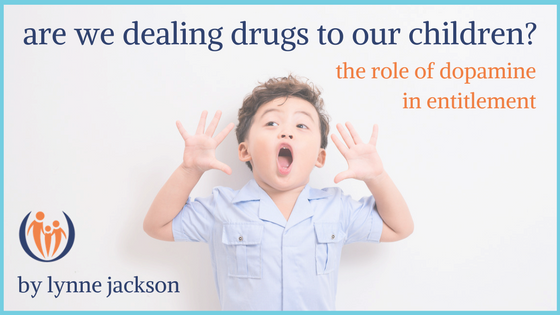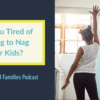
Are We Dealing Drugs To Our Children?

Did you know you may inadvertently be dealing “drugs” to your children?
Dopamine has been called the brain’s “pleasure chemical.” It is released when pleasure is experienced. It creates healthy motivation to pursue various life-giving pleasures such as accomplishing a goal, taking on a new challenge, or connecting with others in meaningful ways.
According to Amy Banks MD, in an ideal world dopamine bursts would happen primarily through pursuit of healthy, life-giving activities – particularly through nurturing human connection. Unfortunately, we live in a world that has many of us seeking dopamine in all the wrong places, like overeating and obesity, drug and alcohol abuse, and consumerism.
Related to dynamics with our kids, it starts out innocently enough. When you smile and give your child that thing they are SO excited about and you get a big hug – Shazam! a dopamine feast for both of you! It felt so good. Let’s do it again. And you do it again. And they do it again.
And pretty soon contentment becomes dependent on dopamine bursts.
Keep in mind here that God created dopamine to help motivate us through the healthy ebb and flow of a productive, relationally connected life. Bursts of dopamine can be a really good thing when we need to wake up numerous times each night with our newborn babies – dopamine gives joy in the exhaustion as we hold our little one to our skin and feel his heartbeat. It keeps us coming back for more – which our babies need!
But when dopamine is increasingly achieved through new stuff or experiences, screen time, sugar, or getting a constant supply of the latest greatest technology, that’s when entitlement attitudes start creeping in. Why? Because brains become dependent on those more intense “shazam” dopamine bursts, even if it takes an argument or conflict with a parent to get it.
There are many factors that feed unhealthy dopamine seeking:
- Stress: For many kids, learning to find their way in an increasingly complex world is stressful – particularly if those kids have intensely wired nervous systems. Stress depletes dopamine, and stressed kids may do any number of things to get their fix.
- Lack of sleep: The schedules families keep these days tend to get kids to bed later and up earlier. As a result, an estimated 25 – 30% of children don’t get enough sleep. By ages 11 – 17 that number is a whopping 87%! Losing sleep then causes stress.
- Poor diet/high sugar intake: Sweets increase dopamine, and with repetition the body begins to crave sweets due to low dopamine. Stressed kids and sleep deprived kids really like sugar. Any wonder why?
- Creative inclination: Kids who are highly creative often have lower dopamine levels. They are drawn to new and interesting things and thrive with experiences that are “out of the box.” The downside is that boredom becomes painful and “life as usual” can be more stressful.
- Screen time: The more screens and dings, the more dopamine. Checking notifications or the deep desire to “reach the next level” increases stress. When parental-limits are put in place, kids can become really stressed and unbalanced when they don’t receive the constant unhealthy dopamine bursts they think they need.
- Constant arguments: Power struggles and arguments increase stress, deplete dopamine for both parents and kids. Kids grow more intent on boosting their sagging dopamine with shiny new stuff, and parents grow more likely to avoid the arguments by giving in.
Enough bad news! What can I do?
As was stated above, dopamine is a God-given gift. It’s intended to come through the pleasure of doing what God built us to do. An easy place to start is to choose one area above to focus on during the next few months, such as starting bedtime 15 minutes earlier, or making screens off limits one hour before bed.
When you are ready to kick dopamine-fed entitlement out the back door, DO MORE that leads to healthy, God-honoring dopamine bursts. In our Entitlement Fix Online Course, we talk about how to say “NO” to unhealthy dopamine bursts, and how to say “YES” in entitlement-defeating, relationally connective ways. Here are three of our key points:
- Avoid stressful power struggles. In our online course you’ll learn kind but firm scripts to diffuse power struggles without giving in to demands, and you’ll learn to prevent them in the first place with our Yes-No-Maybe chart.
- Connect well and encourage your kids. Two university researchers discovered that children valued material possessions less after they received affirmation for qualities others appreciated in them! (This totally makes sense based on how dopamine works.) You’ll learn to affirm in rewarding ways without reinforcing entitlement, using what we call the ABC’s of affirmation.
- Help kids truly enjoy giving and serving, especially in creative ways. We call this “The bigger YES!” In the course you’ll learn how to give your best energy to saying “YES!” to the stuff that God built us to do; activities that leads kids to the healthy dopamine producers of hard work, gratitude, generosity and service.
If you have a child who struggles with entitlement (or low dopamine levels), there is hope! We built this course for you. We’d love to equip you to guide your family out of the entitlement trap. Our desire is that your family will experience rich connection with God, each other, and God’s purposes for you in this world! Join us today!







